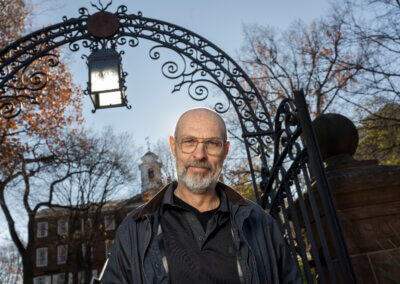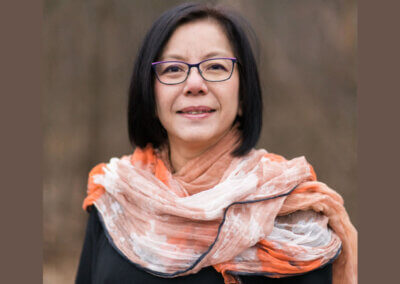RESEARCH & INNOVATION
RESEARCH AT MASON GROSS | RESEARCH CENTERS | RESEARCH & PROFESSIONAL ACTIVITY FUND | RESEARCH SPOTLIGHTS
Research is fundamental to what we do at Mason Gross School of the Arts. As an arts conservatory in a public research university in a diverse region with a robust arts scene, Mason Gross is uniquely positioned to forge new paths in the study and practice of the arts—to create new knowledge about and through the arts in ways that are rigorous, inclusive, exploratory, and engaged.
Mason Gross is home to a world-renowned faculty that conducts research and actively fosters a culture of research among our students. See the full faculty directory for a more detailed look at faculty work.
Mason Gross also houses four research centers that stand at the leading edge of their disciplines: the Arts in Health Research Lab, the Documentary Film Lab, the Integrated Dance Collaboratory, and the Rutgers Printmaking Collaborative. Read about the innovative work of these research centers.
Research at Mason Gross
Meet Our Director of Research
Professor Stephanie Cronenberg of the Mason Gross Music Department serves as the school’s inaugural Director of Research. This new position was established to build infrastructure for research at Mason Gross, to augment the interdisciplinary initiatives already underway, and to help enhance MGSA’s standing across the university and beyond.
What is research at Mason Gross?
Mason Gross School of the Arts is home to researchers who are forging new understandings of and through the arts. As a school, we view the study and practice of the arts as inseparable and equally important forms of research, since both study and practice have the potential to create new knowledge. Some of our faculty members engage in research by writing groundbreaking studies of the history, theory, perception, meaning, and practice of the arts across time periods and cultural contexts. Other faculty members at Mason Gross use their artistic media—from musical composition to dance improvisation, from documentary filmmaking to sculpture—to explore ideas and pressing issues confronting society today. Rooting their artistic practice in broad understandings and committed engagement with the world around them, these faculty members create art that challenges audiences and viewers to rethink the world and their place in it. While every research project and area are different, the Mason Gross Future Roadmap [PDF] has laid out a vision for collaborative and community-engaged research that will advance interdisciplinary thinking and advance the public good. To discuss possible research collaborations, please contact Stephanie Cronenberg, director of research at Mason Gross.
Can students engage in research at Mason Gross?
Yes! At Mason Gross, our world-renowned faculty guide their students to participate in innovative research in many contexts. Students learn to ask productive questions and develop new paradigms that will shape their disciplines and help to address the most pressing issues facing our society. Undergraduate students work with faculty to create new work that pushes at the boundaries of their fields, and they are also encouraged to participate in university-wide programs like Byrne First-Year Seminars and the Aresty Research Assistant Program to develop the habits and skills of researchers. Students in our rigorous, pioneering graduate programs learn to participate in the most current practices and conversations in their fields.
What is arts-integrated research?
Arts-integrated research involves the incorporation of arts mindsets—“the mindsets and practices of creativity and making”—into interdisciplinary research. We believe that every research initiative in every discipline can benefit from arts integration, since the arts offer new ways to perceive, comprehend, communicate, inspire, galvanize, and advocate. To spark new collaborative, arts-integrated research, Mason Gross School of the Arts recently developed a model for “speed networking,” which we implemented for the first time in 2021, first with the Rutgers School of Public Health and then with the School of Environmental and Biological Sciences. These “speed networking” programs have yielded early funding successes through an internal seed grant opportunity and through the Rutgers Research Council, and this system has since been adopted as a campus-wide model by the Office of the Vice Provost for Research at Rutgers-New Brunswick and a signature “Excellence” program by the Office of the President.
Rutgers University has signaled its commitment to arts-integrated research by becoming a member of a2ru (the Alliance for the Arts in Research Universities), a national consortium of research universities seeking to advance arts-integrated research and pedagogy.
Research Centers and Initiatives
Mason Gross artists collaborate with local communities and with scholars across the university and around the world to advance research that serves the public good.
Arts In Health Research Lab
The Arts in Health Research Lab is a collaboration between Mason Gross School of the Arts, the Rutgers School of Public Health, and the New Jersey Performing Arts Center. The lab will perform arts-in-health research in New Jersey, develop innovative research strategies, including arts-based research methods, and establish a research plan to assess the health impact of Mason Gross and NJPAC’s productions and programs.
Read our media release on the lab’s launch.
Documentary Film Lab
The Documentary Film Lab collaborates with researchers across the university and around the world, engaging students in creating documentaries about pressing issues in the sciences, in the history of our local community, and other topics of widespread importance and concern.
Environmental Arts
Faculty and students at Mason Gross School of the Arts are engaged in work at the leading edge of the field of Environmental Arts. Our efforts in this area are now coalescing into major initiatives—many of them in collaboration with our colleagues at the School of Environmental and Biological Sciences—in the areas of artistic research, curriculum, and public programming.
Integrated Dance Collaboratory
The Integrated Dance Collaboratory is a hub of interdisciplinary research exploring dance’s unique rehabilitative potential for individuals with a wide range of physical and mental health conditions such as autism, traumatic brain injury, cerebral palsy, stroke, chronic pain and fibromyalgia, mental illness, and cognitive decline.
Rutgers Print Collaborative
The research-driven Rutgers Print Collaborative cultivates an experiential learning environment for publication, education, and the advancement of prints/multiples. The studio provides guest artists the environment and resources to research topics based on current social issues in the art world—and world at large—through the catalyst of student interaction and experimentation.
Research & Professional Activity Fund
Mason Gross School of the Arts makes funding available for full-time members of its faculty to participate in research and professional activities that align with the mission of the school. Such activities may include travel to participate in conferences, to give performances, or to install exhibits; the purchase of materials, supplies, or services that further a specific research project; or other professional expenses relevant to work of the faculty.
Lecturers are referred to the Lecturer Professional Development Fund, administered by the office of the Executive Vice President for Academic Affairs.
Who is eligible to apply?
All full-time faculty are eligible to apply for funding to support professional activities.
How much funding can a faculty member request?
Maximum funding amounts are determined by the rank of the faculty member applying for support, with priority given to the professional development of pre-promotion research faculty:
- Group 1: assistant professors on the tenure track and professional practice track: $2,000
- Group 2: associate, full, and distinguished professors on the tenure track and professional practice track: $1,500
- Group 3: lecturers, teaching-track instructors, and teaching-track assistant, associate, and full professors: $1,000
All school-supported travel must be booked through the Rutgers Travel Online Booking Tool. Receipts for approved expenses must be submitted via Rutgers Expense Management, accessible through the myRutgers portal, within 30 days of the expenditure and no later than June 30 of the academic year in which the funds are awarded. If receipts are not submitted by June 30 of that year, the funds will be counted against that faculty member’s professional activity expenses for the following year.
Process
Faculty members applying for support from the Research & Professional Activity Fund must apply via the link below. The application will be reviewed first by the department chair/director and then by the director of research, who will make funding recommendations to the dean. The final decision rests with the dean. Applicants should expect to receive a response within two weeks of submitting their forms.






